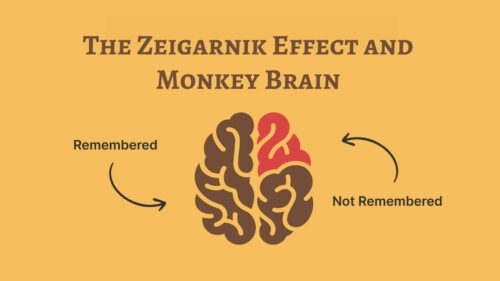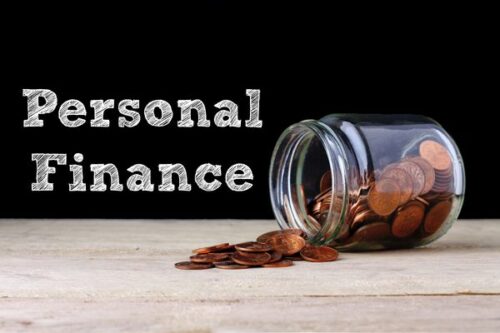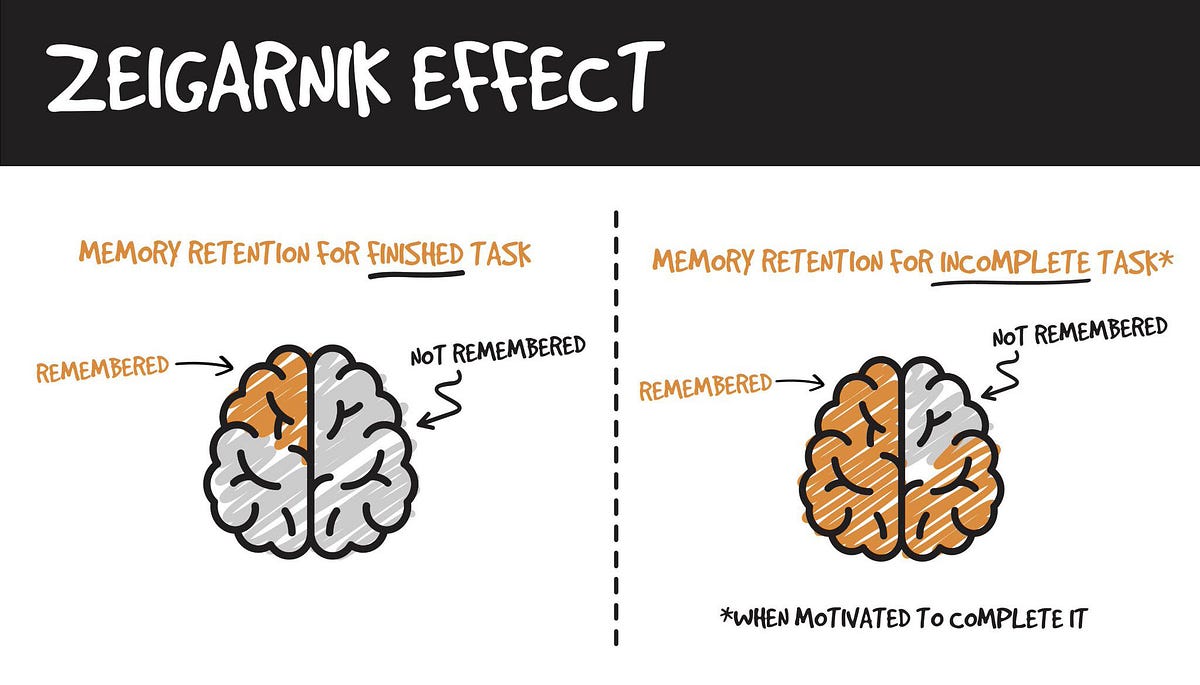“What is not started today is never finished tomorrow.”
– Johann Wolfgang von Goethe

My wife and I do not watch much television. There was one series that we watched religiously week in and week out. It was 24 (#aff). When it was time for another season, we were glued to our seats at 9:00 PM every Monday night to watch what Jack Bauer would do next. Almost every episode ended with some plot twist leaving us wondering what would happen next week. Our conversations for several days revolved around the show, and it wasn’t until about Saturday that our Jack Bauer obsessions would subside, but by then, it was time to start anticipating the next episode.
Fox had hooked us using the Zeigarnik Effect.
The Zeigarnik Effect and Monkey Brain

The Zeigarnik Effect involves a person’s innate desire to complete tasks that they start. When we are in the middle of a task and get interrupted, we tend to forget the tasks that we have completed, while the unfinished task rattles around in our brains. It’s why television shows use cliffhangers at the end of each episode to keep us hooked. Even Charles Dickens used it, as crowds would wait at docks in New York City to get the next installment of Oliver Twist.
I personally experienced this once we decided to pay off our mortgage. My poor wife had to listen to me prate on about how close we were and when we could pay it off. Every dog walk. I was obsessed because we’d started the goal, and it meant so much to me to have it paid off that it felt like Ms. Zeigarnik had personally invaded my brain and used mind control on me.
How did we solve the 24 dilemma? We decided to stop watching it in real-time and wait for the season to end and come out on Netflix. The mental anguish of having to wait a WHOLE WEEK for each episode was simply too much for our nervous systems to handle.
So, in short, we procrastinated about watching the new season of 24.
Why did we procrastinate?
Because, as the Zeigarnik Effect explains, we don’t want to start tasks that we can’t finish right away. We throw something new at ourselves for Monkey Brain to obsess over, and boy does he. He will obsess over that uncompleted task to the detriment of other tasks.
So, we wait. We don’t start. Procrastination is the key to tomorrow.
How the Zeigarnik Effect relates to personal finance

How many times have you had a thought along the lines of “I’ll start saving for retirement soon” or “I’ll start budgeting next month” and then, you never do it?
Why don’t people actually do something rather than planning to do it soon?
It’s because we’re overwhelmed with the enormity of the task. Saving up enough money for retirement is a huge task and will take a very long time to complete. If we try to step back and contemplate the entire task, we’re going to be overwhelmed with the sheer size of it. Flummoxed with intimidation, we shy away from even beginning. Monkey Brain comes up with better ideas, such as going out for an ice cream or buying new shoes to make ourselves feel better. Tomorrow never comes.
Fortunately, the Zeigarnik Effect is a double-edged sword, which we can use to make progress.
Aquam cavat lapidem, non vire, sed saepe cadendo.
Water hollows rock, not by force, but by constantly dripping.
Why was I drawn inexorably towards doing everything I could to pay off my mortgage as quickly as I could?
I had started. I had committed to the savings goal. My mind was bought in that this was important it was a priority and it was the right thing to do.
Thus, the Zeigarnik Effect took over in a positive way, as it kept me motivated. I had that unfinished goal rattling around in my brain because now that I had started it, basic human psychology drove me to finish it.
The key to using the Zeigarnik Effect to your advantage and to defeat Monkey Brain is to start somewhere. It doesn’t have to be at the beginning. But, it does have to be a start. It has to be something important enough that you deem it a priority in your life. Because it’s important enough for you to prioritize it, once you get started, the Zeigarnik Effect will take over, making that goal rattle around in your head and drawing you inexorably to the conclusion. The cliffhangers will start, but they’ll keep you going until you finish all of the episodes.
Author Profile
- John Davis is a nationally recognized expert on credit reporting, credit scoring, and identity theft. He has written four books about his expertise in the field and has been featured extensively in numerous media outlets such as The Wall Street Journal, The Washington Post, CNN, CBS News, CNBC, Fox Business, and many more. With over 20 years of experience helping consumers understand their credit and identity protection rights, John is passionate about empowering people to take control of their finances. He works with financial institutions to develop consumer-friendly policies that promote financial literacy and responsible borrowing habits.
Latest entries
 Low Income GrantsSeptember 25, 2023How to Get a Free Government Phone: A Step-by-Step Guide
Low Income GrantsSeptember 25, 2023How to Get a Free Government Phone: A Step-by-Step Guide Low Income GrantsSeptember 25, 2023Dental Charities That Help With Dental Costs
Low Income GrantsSeptember 25, 2023Dental Charities That Help With Dental Costs Low Income GrantsSeptember 25, 2023Low-Cost Hearing Aids for Seniors: A Comprehensive Guide
Low Income GrantsSeptember 25, 2023Low-Cost Hearing Aids for Seniors: A Comprehensive Guide Low Income GrantsSeptember 25, 2023Second Chance Apartments that Accept Evictions: A Comprehensive Guide
Low Income GrantsSeptember 25, 2023Second Chance Apartments that Accept Evictions: A Comprehensive Guide

